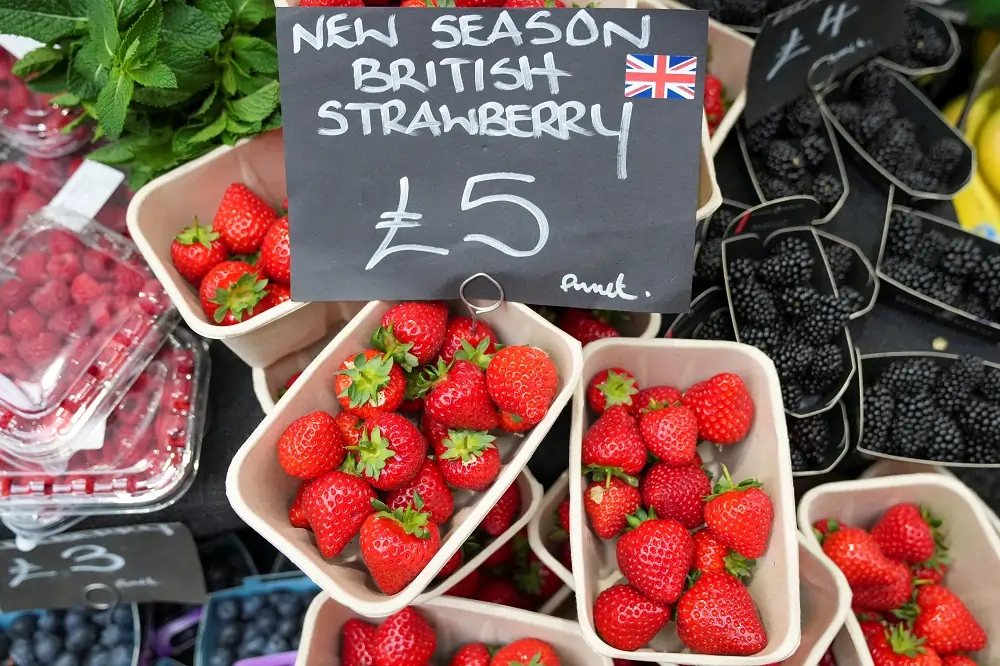
UK inflation pressure stays hot, dashing hopes for June rate cut
By Andy Bruce and Suban Abdulla
LONDON (Reuters) -Inflation in Britain eased less than expected and a key core measure of prices barely dropped, prompting investors to pull bets on a Bank of England rate cut next month which could have boosted embattled Prime Minister Rishi Sunak before an election.
The consumer price index (CPI) rose by 2.3% in the 12 months to April, down sharply from March’s 3.2% increase and its lowest since July 2021, the Office for National Statistics said.
But the BoE and economists polled by Reuters had forecast a bigger drop to 2.1%, just above the central bank’s 2% target, after a big cut to household energy tariffs in April.
Services inflation – a gauge of domestic price pressure for the BoE and which is also a problem in other European countries – was much higher than expected, and petrol prices rose.
Sterling jumped and investors slashed the chance of a BoE rate cut in June to just 18%, down sharply from 50% on Tuesday.
“This is only one month’s data, but it is enough of a surprise to suggest that the inflation process is not tracking as the BoE had expected,” Allan Monks, chief UK economist at JP Morgan, said.
“There is still another labour market and CPI report to come before the June meeting, but it is difficult for us to see what that could realistically do to leave most members feeling confident about cutting in June specifically.”
Services inflation inched down to 5.9% from 6.0% in March. The BoE’s forecasts and the Reuters poll had pointed to a reading of 5.5%.
Analysts at RBC Capital said the overshoot in services inflation did not appear to be driven by one-off factors, suggesting further stickiness in prices ahead.
“Certainly this morning takes June off the table,” Cathal Kennedy, senior UK economist at RBC Capital Markets, said.
“We’ve been saying for some time that we thought services inflation would be a lot harder to get down than perhaps some other people out there thought, particularly with the backdrop of the UK labour market which has loosened but is still very, very tight.”
Core inflation, which includes goods but not energy, food and tobacco, also reflected persistent price pressures, with the annual rate falling only to 3.9% from 4.2% in March. The Reuters poll had forecast a reading of 3.6%.
PRICE PRESSURES
Sunak, who is struggling to woo voters back to his Conservative Party ahead of national elections expected later this year, focused on the fall in headline inflation.
“Today marks a major moment for the economy, with inflation back to normal,” he said in a statement.
But the opposition Labour Party – far ahead of Sunak’s Conservatives in the opinion polls – said voters were still under pressure from their finances.
“Prices in the shops have soared, mortgage bills have risen and taxes are at a 70-year high,” Labour’s finance spokeswoman Rachel Reeves said.
Wednesday’s data means Britain has a lower rate of inflation than the United States, Canada, France and Germany. Japan is yet to report April inflation data. Italy’s inflation rate is 0.9%.
Still, Britain ranks poorly among Western European countries for its inflation record since 2020, with consumer prices up by more than 22% over that time frame – with only the Netherlands, Austria and Germany faring as badly.
Headline inflation’s swift fall from a high of 11.1% in October 2022 now appears to have run its course.
The BoE has forecast the CPI to rise again later this year to end 2024 at around 2.6%.
Recent labour market data has shown private sector regular wage growth eased only marginally in the three months to March, keeping the BoE on alert about inflationary heat in the economy.
Separate ONS data on Wednesday dealt a further setback to Sunak and finance minister Jeremy Hunt, showing public borrowing in April was higher than expected, which raising questions about their ability to deliver tax cuts to voters before the election.
(Additional reporting by David Milliken; Graphic by Sumanta Sen; Editing by Christina Fincher and Hugh Lawson)


